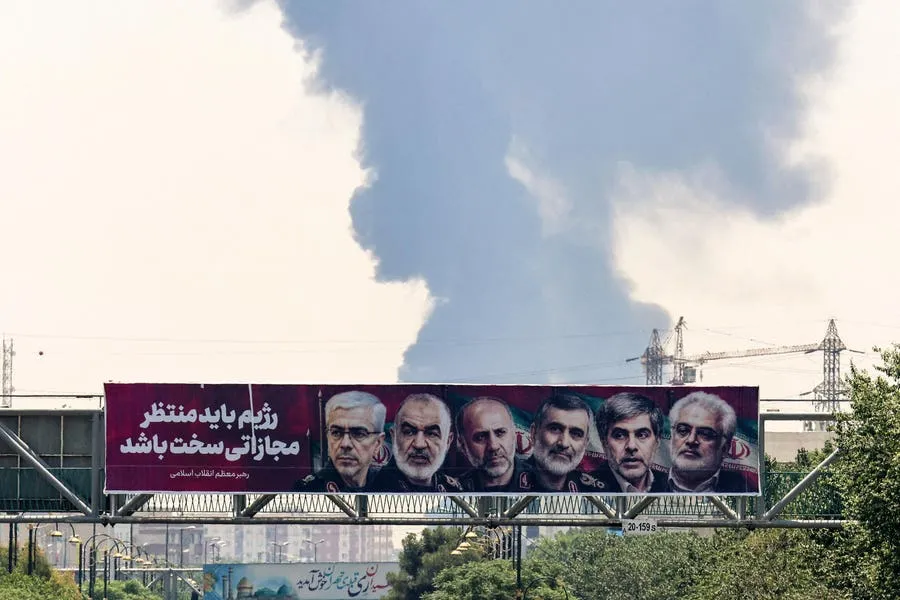Forbes contributors publish independent expert analyses and insights.
Last summer, Iran appeared to be well and truly on the march. Its chief Palestinian proxy, Hamas, had succeeded in bogging Israel down in a costly ground war in Gaza - and turning global public opinion against the Jewish state in the process. The United States, under the Biden administration, didn't appear to have much of an answer to Iran's persistent pursuit of nuclear status, or to the growing regional threat posed by its other proxies, like Yemen's Houthi rebels. And vulnerable Gulf states, acutely aware of this dynamic, were increasingly seeking some sort of accommodation with Tehran. As a result, the Iranian leadership's strategic ambitions had begun to expand dramatically.
That, however, was before Israel's offensive against Hezbollah in southern Lebanon left the Shi'ite militia decimated. Israel's parallel October strike on Iran succeeded in destroying Iran's air defense architecture, leaving its nuclear facilities exposed. Then, in December, Syria’s Bashar al-Assad fell from power unexpectedly, overthrown by Islamist rebel forces, robbing Tehran of another regional ally.
But it was not until June 2025 that the extent of Tehran’s fragility was truly revealed. Beginning on June 13, Israel’s “Operation Rising Lion” systematically targeted key nodes in Iran’s nuclear program, as well as senior military leaders and nuclear scientists responsible for making it tick. That effort, in turn, was dramatically amplified by the Trump administration’s decision to wade into the fray, using American military superiority to target hardened and buried elements of Iran’s atomic effort - to devastating effect.
Now that the dust has settled, the regional picture in the Middle East looks strikingly different. But, while the Islamic Republic is now down, it isn’t out. The weeks ahead are liable to see some big changes within the country, as Iran’s political establishment scrambles to survive. Here are a few things to watch for:
Iran’s Supreme Leader, Ali Khamenei, is now 86 years old and suffering from a range of medical ailments. So far, though, Khamenei has studiously avoided appointing a successor to Iran’s top ideological post, preferring instead to play various factions in the Islamic Republic’s byzantine political structure against one another. Such a strategy is no longer viable. The recent war has exposed the fragility of Iran’s clerical regime and made planning for leadership succession an even more urgent matter. Indeed, insiders report that the clerical committee tasked with selecting a successor to Khamenei has accelerated its search efforts in recent days. How that search turns out will tell us a great deal about the future complexion of the Islamic Republic—and how it will behave vis-à-vis the region and the West.
Iran’s clerical army is already a key power center, but the recent conflict has left it on the precipice of becoming the dominant political force in the country. Ahead of the war, Iran’s Supreme Leader reportedly delegated key national security and strategic decision-making authority to the IRGC. And, in brokering a ceasefire with Israel, the Guards are said to have bypassed direct communication with Khamenei and hammered out the deal themselves. The IRGC, in other words, is steadily gaining in power—and could soon wield controlling interest within the Islamic Republic as a result.
Iran is already one of the world’s most repressive nations, but the months ahead are likely to see a new wave of arrests, executions and disappearances as its government seeks to reestablish authority and control. Indeed, this is already happening. In the wake of the war, Iran’s majles passed emergency legislation classifying espionage on behalf of the United States or Israel as “corruption on Earth,” a capital offense under Iran’s Islamic penal code—and making a wide array of activities, from the sharing of images with foreign media to social media engagement with Israeli-linked accounts to contact with exiled opposition figures, tantamount to that crime. That development has been mirrored by a new regime clampdown on suspected spies and suspected collaborators, complete with mass arrests and executions. (The nonprofit Center for Human Rights in Iran has estimated that nearly 1,500 Iranians have been arrested since the end of the conflict in late June.)
All this gives us a flavor of what we can expect in the near future from the Islamic Republic—and within it. Having weathered Israel’s military offensive, Iran’s leadership is now focused on domestic stability, ideological legitimacy and political control, underpinned by a clear understanding: they must harden their rule or perish.
